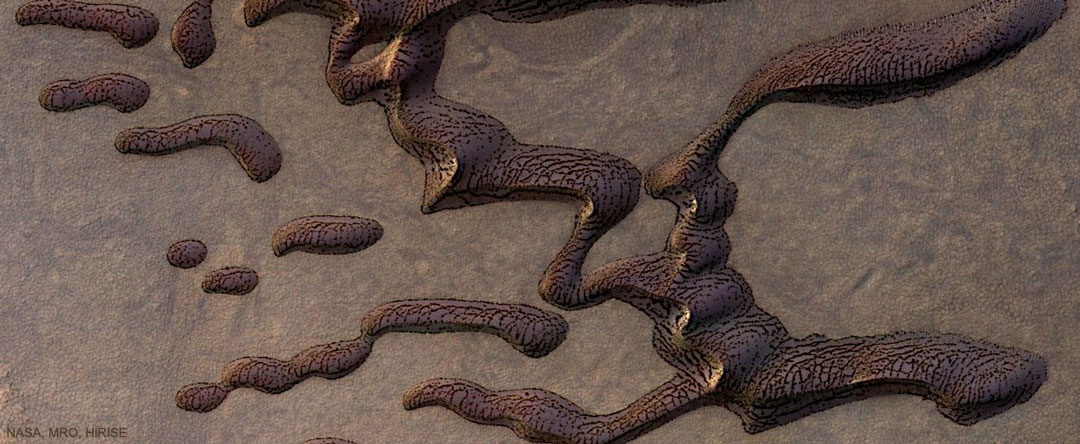2021年01月06日
Striped Sand Dunes on Mars
Image Credit: HiRISE, MRO, LPL (U. Arizona), NASA; Processing: Włodek Głażewski;
Text: Alex R. Howe (NASA/USRA, Reader’s History of SciFi Podcast)
Explanation: Why are these sand dunes on Mars striped? No one is sure. The featured image shows striped dunes in Kunowsky Crater on Mars, photographed recently with the Mars Reconnaissance Orbiter’s HiRISE Camera. Many Martian dunes are known to be covered unevenly with carbon dioxide (dry ice) frost, creating patterns of light and dark areas. Carbon dioxide doesn’t melt, but sublimates, turning directly into a gas. Carbon dioxide is also a greenhouse material even as a solid, so it can trap heat under the ice and sublimate from the bottom up, causing geyser-like eruptions. During Martian spring, these eruptions can cause a pattern of dark defrosting spots, where the darker sand is exposed. The featured image, though, was taken during Martian autumn, when the weather is getting colder – making these stripes particularly puzzling. One hypothesis is that they are caused by cracks in the ice that form from weaker eruptions or thermal stress as part of the day-night cycle, but research continues. Watching these dunes and others through more Martian seasons may give us more clues to solve this mystery.
Tomorrow’s picture: open space
火星的条纹沙丘
影像提供: HiRISE, MRO, LPL (U. Arizona), NASA; 影像处理: Włodek Głażewski;
文稿: Alex R. Howe (NASA/USRA, Reader’s History of SciFi Podcast)
说明: 为何这些火星沙丘有条纹?目前没人能个准。这幅由火星探勘号轨道船HiRISE相机不久前拍摄的主题影像,呈现火星库诺夫斯基坑内带条纹的沙丘。许多火星沙丘上,覆盖着不匀的二氧化碳霜(干冰),因此造成明暗相间的区域景观。二氧化碳不会溶化,只能直接升华成气体。二氧化碳就连在固态时,也是很强的温室物质,能把热局束在冰的下方,让干冰从底部开始升华,造成喷泉式的爆发。当春天降临在火星时,这种喷发会让较暗色的沙露出来,造成由黝黑解冻斑构成的图案。不过,这张主题影像是摄于火星秋季,时值天气逐渐变冷之时,因而使这种条纹特别令人不解。有假说指出,他们是较弱的喷发或日夜交换的热应变所造成之冰缝,不过还尚待研究证实。观察这些及其他沙丘在不同火星季节的变化,或许能找到解开这个谜团的线索。
明日的图片: open space



